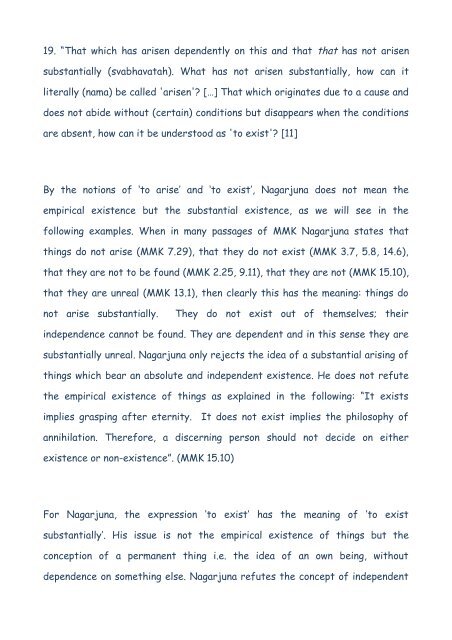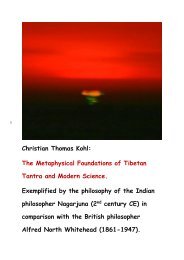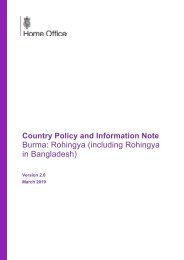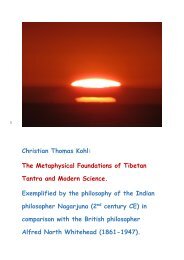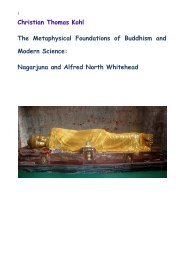Christian Thomas Kohl The Metaphysical Foundations of Buddhism and Modern Science
Christian Thomas Kohl The Metaphysical Foundations of Buddhism and Modern Science
Christian Thomas Kohl The Metaphysical Foundations of Buddhism and Modern Science
You also want an ePaper? Increase the reach of your titles
YUMPU automatically turns print PDFs into web optimized ePapers that Google loves.
19. “That which has arisen dependently on this <strong>and</strong> that that has not arisen<br />
substantially (svabhavatah). What has not arisen substantially, how can it<br />
literally (nama) be called 'arisen'? […] That which originates due to a cause <strong>and</strong><br />
does not abide without (certain) conditions but disappears when the conditions<br />
are absent, how can it be understood as 'to exist'? [11]<br />
By the notions <strong>of</strong> ‘to arise’ <strong>and</strong> ‘to exist’, Nagarjuna does not mean the<br />
empirical existence but the substantial existence, as we will see in the<br />
following examples. When in many passages <strong>of</strong> MMK Nagarjuna states that<br />
things do not arise (MMK 7.29), that they do not exist (MMK 3.7, 5.8, 14.6),<br />
that they are not to be found (MMK 2.25, 9.11), that they are not (MMK 15.10),<br />
that they are unreal (MMK 13.1), then clearly this has the meaning: things do<br />
not arise substantially.<br />
<strong>The</strong>y do not exist out <strong>of</strong> themselves; their<br />
independence cannot be found. <strong>The</strong>y are dependent <strong>and</strong> in this sense they are<br />
substantially unreal. Nagarjuna only rejects the idea <strong>of</strong> a substantial arising <strong>of</strong><br />
things which bear an absolute <strong>and</strong> independent existence. He does not refute<br />
the empirical existence <strong>of</strong> things as explained in the following: “It exists<br />
implies grasping after eternity. It does not exist implies the philosophy <strong>of</strong><br />
annihilation. <strong>The</strong>refore, a discerning person should not decide on either<br />
existence or non-existence”. (MMK 15.10)<br />
For Nagarjuna, the expression ‘to exist’ has the meaning <strong>of</strong> ‘to exist<br />
substantially’. His issue is not the empirical existence <strong>of</strong> things but the<br />
conception <strong>of</strong> a permanent thing i.e. the idea <strong>of</strong> an own being, without<br />
dependence on something else. Nagarjuna refutes the concept <strong>of</strong> independent


